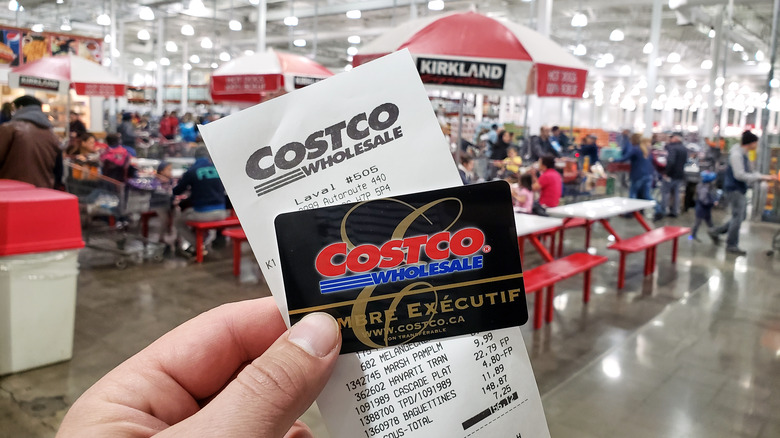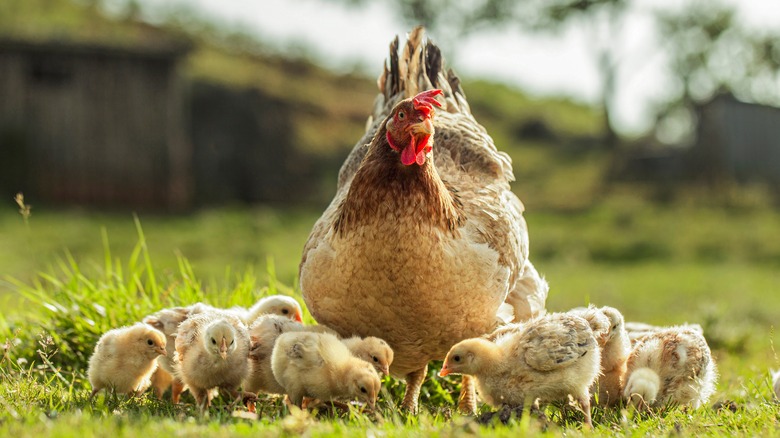Why Costco Stopped Selling Caged Eggs
Costco sells a lot of stuff — and when we mean a lot of stuff, we're not kidding around. Costco is a place you can purchase your favorite coffee in bulk alongside jugs of mixed nuts and tires for your truck. It's big-bulk goods for low prices, or at least that's what Costco says anyway. With over 581 locations across the United States and 116.6 million members as of May 2022, according to reporting by Zippia, it's clear that the big-box store is a major power player in the American shopping market. Indeed, many Americans can find a large selection within the warehouse-like aisles of their local Costco.
But to say that Costco has everything would admittedly be a bit of an overstatement. For as many products as it sells, the store also discontinues an equally large amount of things — some of which were surprisingly popular with regular shoppers. Examples of discontinued products include soft pretzels and polish dogs from the food court as well as beer and soap. One notable example of a discontinued product is eggs, or more accurately, caged eggs. While you can still buy as many eggs as you want at your local Costco, you just can't buy the caged variety.
This seems to be a very strange product to discontinue, considering how important eggs are to most people's diets. Why would Costco give up one kind of egg, instead of getting rid of all of them then?
Why did Costco stopped selling caged eggs?
Costco isn't getting rid of caged eggs because of a lack of popularity. The company has actually been planning on discontinuing caged eggs for quite a while, according to Meat + Poultry. The big-box chain announced in 2020 that they would begin to transition from selling caged eggs to cage-free eggs, noting that as of 2021, nearly 94.2% of the eggs sold in U.S. stores are cage-free eggs (via Costco).
Costco is not the only company that has gone on record stating their transition towards "humane" eggs. NPR reported in 2015 that McDonald's had made the promise to begin using cage-free eggs in their products while USA Today wrote in 2016 that grocery giant Walmart made the statement that it would begin selling free-range eggs. Forbes noted in 2016 that even companies such as SeaWorld and IKEA had also made a vow to sell cage-free eggs. It would appear that many companies across the United States have begun taking pledges to ensure better products without causing harm to the animals in question.
You may be asking yourself, what exactly is so special about cage-free eggs?
What are cage-free eggs?
Cage-free refers to the idea that chickens aren't kept in cages all day long. As The Humane Society tells us, a large majority of hens in the United States reside in "battery cages." Battery cages are said to be 67 square inches in size, with barely enough room for the hens to move their wings. They also have no privacy in this system, with Back Yard Chickens explaining that unless the hen is used to you, they usually lay eggs out of sight in order to feel safe while doing so.
But according to Eater, while the term "cage-free" does mean that chickens are allowed to wander outside of a cage, it's not really the same thing as "free-range." While both free-range and cage-free chickens are allowed to roam with plenty of food and water, cage-free chickens stay inside an enormous barn. Free-range chickens have the potential to wander within an outside area.
Are cage-free eggs all they're cracked up to be?
While stamping out animal cruelty is something we can all be happy about, is this move by Costco and others towards cage-free eggs as beneficial as it seems? NPR writes that while cage-free chickens have only about 1 square foot of space on average, they're still better off than caged birds. "They're not exactly living on Old McDonald's farm, but they're able to walk around, perch, lay their eggs in a nest, and spread their wings — all important natural behaviors," Paul Shapiro, vice president of the Humane Society of the U.S. told the news outlet.
So why not go the extra mile and get free-range eggs? NPR explains that even free-range eggs aren't worth it since the chickens don't go outside all that much, even in the free-range method of production, with pasture-raised eggs being the most accommodating to the needs of the chickens.
So, while some may argue that companies such as Costco should not rest until all eggs are sourced from humane, pasture-based farms, cage-free eggs can be seen as a slow step in the right direction.



